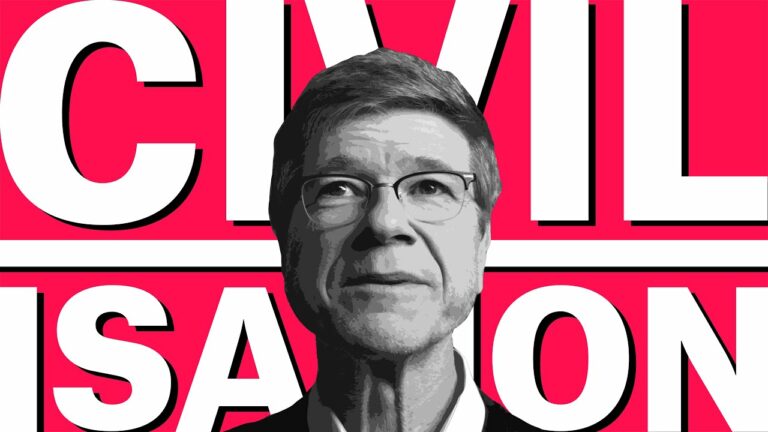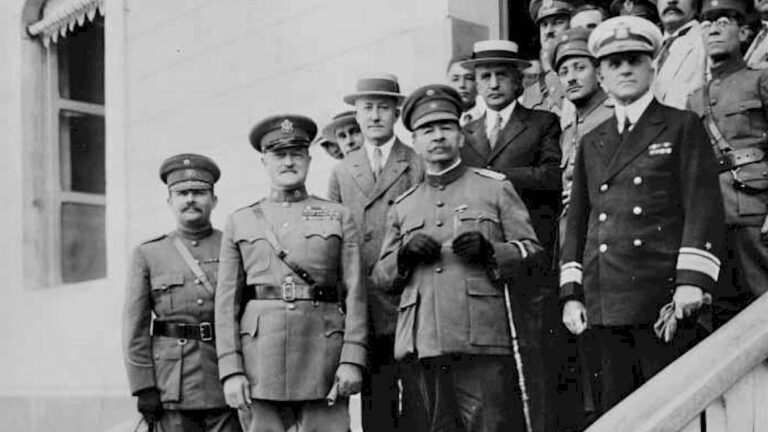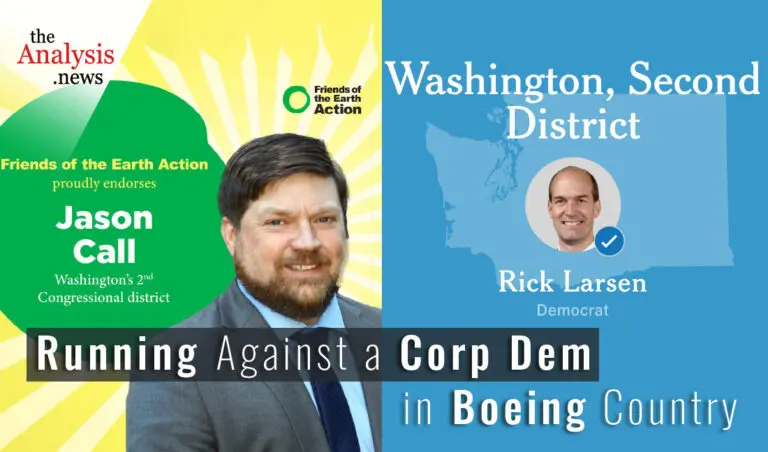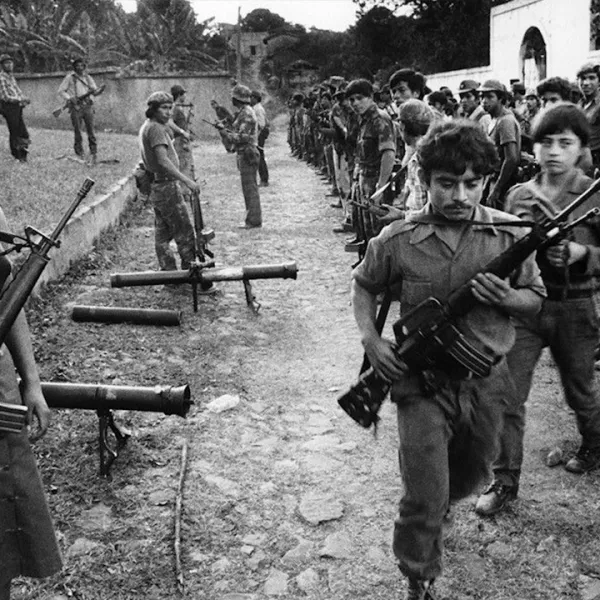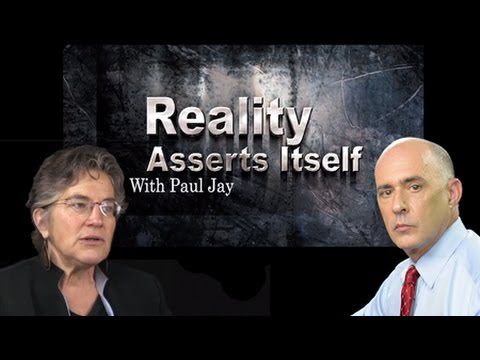This is an episode of Reality Asserts Itself, produced on October 20, 2013. In the final episode of this series of Reality Asserts Itself with Paul Jay, historian Peter Kuznick analyzes the core idea of American exceptionalism, that US military power creates world order.
PAUL JAY, SENIOR EDITOR, TRNN: Welcome to The Real News Network. I’m Paul Jay in Baltimore. And welcome to Reality Asserts Itself on The Real News.
We’re continuing our series of interviews with Peter Kuznick, the cowriter of the 12-part series Untold History of the United States he made with Oliver Stone. Peter’s a professor of history and director of the Nuclear Studies Institute at American University. As I said, he did Untold History of the United States with Oliver. And as we speak, the DVD and digital downloads and paperback version of the book is coming out.
Congratulations on all of that.
PETER KUZNICK, PROF. HISTORY, AMERICAN UNIVERSITY, WASHINGTON: Thank you.
JAY: So just to wind up this series of discussions on American exceptionalism, let me go back to the quote of Senator Beveridge. And I’ll read just a little piece of that quote, which I read in part one of this series:
“He [God] has made us the master organizers of the world to establish system where chaos reigns. He has given us the spirit of progress to overwhelm the forces of reaction throughout the earth.”
Peter, this idea that America stands between order and chaos, it seems to me that goes to the core of American exceptionalism. I don’t know if everyone really believes that America wants to liberate everybody. I know that’s the rhetoric. You know, George Bush goes and invades Afghanistan to save the women of Afghanistan. Most people didn’t believe that. People–most people, I think, understand there is a thread of commercial interest. You know, most people know Iraq was about oil, and they knew it at the time. But there’s another factor there which I think kind of gets people into this idea of exceptionalism, and that’s if we don’t do what we do, there will be chaos. Even if we do bad things, even if we make money out of doing bad things, the alternative to us doing bad things is other people doing worse things.
KUZNICK: Except that people are learning the lesson of that. If you look at the recent statements by Robert Gates–Gates is one of the architects of the American empire for decades. First he screwed up the intelligence agencies. He was behind the reform of the CIA. And he’s a real planner of the wars and empire for a long time, the head of the CIA, head of the Defense Department. He came out a couple of years ago saying that if an American secretary of defense advises a president to invade another country in Asia or Africa or Latin America, he should have his head examined. But he came out more recently saying after Afghanistan, Iraq, and Libya, that anybody who supports another American military intervention, as in Syria, is crazy.
He says that because what he realized that other people realize is that we create the chaos. He says, we don’t ever know what the unintended consequences are and that what results from these interventions is chaos. We’ve–look at the chaos that exists now in Iraq. Did we leave that a peaceful place? Of course not. So people might make the assumption that what we’re doing is better than chaos, but the reality is we create chaos. We don’t know what the ramifications are. We don’t understand the situations. George Bush doesn’t know the difference between Sunnis and Shiites when we go and start this kind of “crusade,” which he called it.
So in some people’s mind, maybe what we’re doing is better than what’s out there. And there’s a lot of bad stuff out there. If you look at the Shabaab in Africa, you look at the other terrorist groups throughout the Middle East or Central Asia, I mean, there’s a lot of very dangerous elements out there. But for us the reckless notion that somehow the United States is going to intervene and make things better in those circumstances is at the root of a lot of the chaos we’ve created in the world.
JAY: These dangerous elements to a large extent were produced by exactly these kinds of interventions.
KUZNICK: Well, and deliberately produced. The Islamic extremists were certainly nurtured by American policy in the late ’70s and early ’80s, Brzezinski and then much more so Reagan. We helped train those people. We helped arm them. We funded them. And we trained them with American books. The University of Nebraska in Omaha created the textbooks that were used to teach jihad among Afghan rebels in the late ’70s and early ’80s.
JAY: Let me make an argument. Let me play devil’s advocate and make the counterargument. I’ve heard the argument made that you have a very intense rivalry, for example, between Saudi Arabia and Iran. It gets reflected in a Shia-Sunni ideological argument. At the heart of it is a big-power regional competition: which of these two powerhouses in the Middle East is going to be the dominant power in the Arab world or Islamic world? And the argument goes that if it wasn’t for the United States being able to maintain a kind of status quo in the region, everybody–not Iran, but all the other countries depend on the United States for arms, to a large extent for military funds–now, not the Saudis, but the Saudis buy massive amounts of military hardware from the United States. But they kind of rely on the United States to keep various regimes and governments in power, and thus they don’t fight each other and it doesn’t erupt into regional warfare as much as it might have if the U.S. wasn’t there.
KUZNICK: But it still erupts–.
JAY: Do you buy that argument?
KUZNICK: No, I don’t buy that argument. It still erupts repeatedly. You trace some of this back to the Iran-Iraq War, for example. That war went on for a decade. Over 1 million people were killed. The United States at different times was supporting each side.
JAY: Fueling it.
KUZNICK: Yeah, fueling it and arming it and giving intelligence. Who were we giving intelligence to? Saddam Hussein, who, of course, we later decide to topple. And we were selling them the ingredients that they use to make their chemical weapons in those cases.
But a lot of–then you look at the chaos that’s going on in Syria, for example, or throughout the Middle East. A lot of that chaos was the result of American invasion of Iraq. That started these sectarian divides. The sectarian divides were not strongly felt in Iraq before that. They certainly weren’t strongly felt in Syria. But now we’ve exported that throughout the region.
So, again, the situation we create, our intention is not to create that, but we go in blind. Americans don’t really know anything about other countries. We’re very, very ignorant. We were totally ignorant about Vietnam. We had actually fired most of the experts at the State Department who knew something about that region as part of the McCarthy purges in the ’40s and early ’50s. We know nothing about the countries we invade.
What do we know about the Vietnamese people? Larry Heinemann, who wrote Paco’s Story, which won the National Book Award, a Vietnam veteran, tells a great story that I love. And he says that he was interviewing somebody from the–a professor at the University of Hanoi. And he says that he asked him, what did you do during the war? And he said, first I went to Beijing and I learned English. Then I went to the University of Moscow and I read American literature. Then I went back to Hanoi, and they sent me out to the Ho Chi Minh trail, where I educated the troops there on the Ho Chi Minh trail about American literature. And they were reading Hemingway, Whitman, Faulkner, Fitzgerald, Jack London. You know, they carried these books in their backpack. They were studying American literature, the Vietnamese troops. And then he turns to Larry Heinemann and he says, and what Vietnamese author did you American troops read? And Heinemann says, I laughed so hard that the beer started to squirt out my nose.
You know, Americans are ignorant. You know. And that to me captures it. That story captures a lot. And so we go into these situations blind. We think that somehow maybe we can impose order. And at times we do. But we impose order at the–you know, what we sacrifice there is social justice in those countries.
So, yeah, we work with the Saudis. Saudi Arabia’s a terrible country where people don’t have any democratic rights, where women–I don’t know if they’re allowed to drive yet or not, but if they are, it’s something very, very new. In a lot of ways, the Iranians have a lot more freedom–not that Iran is a good society in that sense, but they have a lot more freedom than our allies in Saudi Arabia.
ElBaradei, when he was looking at what was the cause of this unrest, he says it was U.S. policy. For decades, the United States supported these very repressive regimes that kept down the educational level in much of the area, that created no civil society, no democratic institutions. And then the thing explodes. It’s not a surprise that it turns Libya to militias killing each other off, or in Iraq you’ve got 50 to 100 people being killed every day. We create chaos where we go. It’s not our intention. We want to stabilize these areas. We could do things to stabilize these areas. We should try to stabilize Syria. We should bring in other countries to help us do that. We bring resolutions before the United Nations. They get vetoed by China and Russia.
What could we do to bring China and Russia in to help us stabilize that region? China and Russia have things that we could offer them to help them partner with us.
The United States’ policy toward China is a hostile aggressive one that Hillary Clinton announced with the “Asia pivot” in late 2011. We’re trying to militarize that whole region to contain China now. The Chinese leading newspaper said recently that if the United States expect Chinese cooperation on anything, they’d better change this policy; otherwise, we’re not going to cooperate on anything.
The Russians. Why do we have this enmity with Russia? What are they concerned about? Missile defense. They’re concerned about weaponization of space. You know, there are things that the United States could do. And they’re concerned about the expansion of NATO, which Bush the first had promised we wouldn’t do, then Bush the second does, and they’re very threatened by that. We could pull back on some of these. If we care about the Syrian bloodbath, which we should, then we would begin to negotiate.
Iran. Iran is reaching out to the United States. It’s not the first time. In 2003, the Iranians proposed what they called a grand bargain, which they would recognize Israel, a two-state solution, in which they would stop supporting Hamas, in which they would rein in Hezbollah, do all the things the United States wanted. But the United States instead wanted to overthrow that regime. We should reach out to the Iranians.
JAY: Yeah. Wilkerson tells this story that Cheney wouldn’t even entertain the offer.
KUZNICK: It was such a generous offer. It would have given the United States everything we wanted vis-à-vis Iran.
JAY: There was something called the “Friendly Dictators” playing cards. Did you ever see this?
KUZNICK: Oh, vaguely, yeah, yeah.
JAY: And every card was the picture of a dictator that had been supported by the United States and considered a friendly dictator. It was a wonderful thing. In fact, I think maybe we’ll see if we can find that artwork and reproduce it somehow. In fact, if anyone’s out there that had anything to do with that thing, get hold of us, ’cause it was brilliantly done. And they’d have in the back of the card the biography of 52 dictators supported by the United States, you know, during the Cold War.
How does–do you see people starting to break through this? I mean, the ability to keep this narrative of exceptionalism going, you know, that we’re there to fight for democracy, the ahistorical view that most Americans have–and I’ve met young soldiers, you know, who went to Iraq or Afghanistan in full belief they were fighting for freedom and to defend the American way and defend this city on the hill, fully believe it, and knew nothing about any of the history of the places they were going to.
KUZNICK: That’s the struggle that you’re up against. It’s the struggle that Oliver and I are up against. The positive thing: we see the response to our Untold History. We were told by a leading expert in Turkey that Untold History had gone viral in Turkey. It was being discussed everywhere. This was before, right before the uprising. We have great viewership all over the world and we’re getting into more and more markets. So it’s going out all over the world.
And now with these developments here, Oliver and I do interviews as much as we can. We speak at campuses all over the country. We’re doing everything we can to get it out, because much like you do with Real News, we’re trying to challenge that narrative. And people are receptive if they can hear it. Oliver has Garrison say in–oh, no, Mr. X character, played by Donald Sutherland, says in Oliver’s movie JFK, he says, deep down, “people are suckers for the truth.” And we have to have that faith that if people are given the choice between bad history, bad science, and the truth, that a big percentage are going to gravitate toward the truth, which is why one of the factors in Syria that people don’t comment on very much, although it’s being recognized now, is that there’s been a six-year drought in Syria that preceded this uprising, in which 75 percent of the farmers went bankrupt and they moved into the cities. In some areas, 85 percent of the livestock died. And then they moved into the cities and created all this chaos, including areas where the uprising first began. But NOAA, the American agency, said that the drought in the Middle East, especially Syria, was caused by man-made global warming. And you’ve got people out there who are climate deniers, the Koch brothers and their ilk, especially the energy companies, who pour millions and tens of millions of dollars to create bad science to mislead the American people about man-made global warming, which is a very serious crisis that we also have to take quite seriously. But that’s the same problem, a parallel problem to what we deal with bad history or just historical ignorance.
We’re trying to get Untold History into the schools. We’re trying to get it as part of the official curriculum, high school curriculum in California right now. We’ve got a middle school book coming out. We’ve got a comic book, a graphic novel coming out. We’ve got it coming out–it’s coming out in Arabic and Russian and Chinese and Korean and other languages. So that’s the goal is to–we’re arguing–we’re believing that if we reach people, we can persuade them that there’s another way of solving problems. And maybe we could even influence people in this country that there is another way of solving problems, because they see that militarism isn’t working, which is why this latest–the resolution on Syria that both houses of Congress were about to vote down, to me it’s astounding.
I give Putin a lot of credit for introducing a way to eliminate chemical weapons, which is a good thing, but I deplore him for his timing. Had he waited one more week, both houses of Congress would have voted down that measure. It would have sent such a signal to the world and I think would have been the most important victory for the antiwar movement in the United States in decades, since Vietnam.
JAY: Well, I think–someday I think we’ll find out just what President Obama gave Putin to save his bacon,
KUZNICK: To save him, yes.
JAY: Because he was in a corner and Putin saved Obama’s bum there.
Thanks very much for joining us.
KUZNICK: Thank you.
JAY: And thank you for joining us on Reality Asserts Itself on The Real News Network.
Never miss another story
Subscribe to theAnalysis.news – Newsletter
“Peter Kuznick is a professor of history and director of the award-winning Nuclear Studies Institute at American University and is currently serving his sixth three-year term as a distinguished lecturer with the Organization of American Historians. He has written extensively about science and politics, nuclear history, and Cold War culture.”




